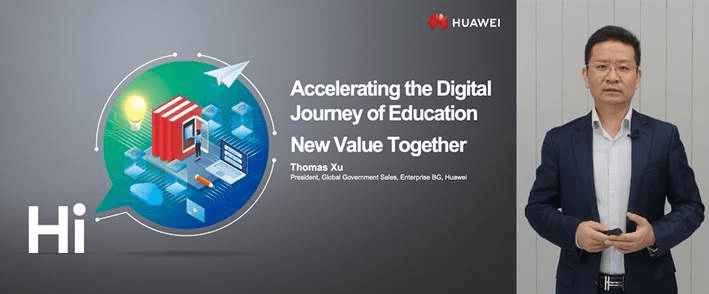The Huawei Global Intelligent Education Summit 2021 — themed Accelerate the Digital Journey of Education: New Value Together — has officially commenced online. During the event, Huawei proposed the principle as “3/3/9”, which will be the foundation of the all-scenario education solution that aims to speed up the digital upgrade of the education industry. Together with partners, Huawei aims to create new shared value by enabling innovative teaching methodologies, inclusive educational resources, improved research capabilities, and optimised management approaches.

At the summit, Huawei introduced the “3/3/9” principle of the all-scenario education solution. It targets “three” key customer groups: basic education, higher education, and NREN. It focuses on “three” major scenarios: smart classroom, smart campus, and research innovation. And finally, the solution offers “nine” customisable solutions: hybrid learning, collaborative classroom, digital classroom, intelligent collaboration, safe campus, school connectivity, smart campus network, NREN, and HPC. Together, “3/3/9” accelerate the digital upgrade of the education industry.

Thomas Xu, President of the Global Government Sales of Huawei Enterprise BG said: “The education industry is seeing the inevitable deep integration of teaching and technology. The pandemic has made us realise that intelligent education has never been a more urgent demand. In the future, teaching, management, and research will become fully aware, fully connected, and fully intelligent. Joined by ecosystem partners in the education industry, Huawei will help our customers transform faster towards all-scenario intelligent education.”
Huawei is actively working on cultivating qualified talent in the field of higher education. It is creating customised solutions that will go beyond traditional classrooms, spur on innovative teaching methods, improve research and innovation efficiency, and upgrade management. For vocational education, Huawei promotes the integration of education with hands-on industry practice by encouraging students’ practical learning that will prepare them for the markets’ demand for job-ready talent.
Fahem Al Nuaimi, CEO, Ankabut, said: “Huawei technologies has enabled us to deliver a great variety of quality cloud services to our partners across the UAE — which has boosted efficiency, reduced costs, and facilitated collaboration across the education industry.”
At the summit, Huawei reiterated its three strategic initiatives aimed at helping the education industry create digital education institutions that are part of a solid ecosystem. These are: (1) Gain in-depth insights into industry scenarios, explore industrial digitalisation, and share educational resources to achieve inclusive and quality education. (2) Striving for mutual benefit, Huawei integrates the technical advantages of solutions and diversified incentive resources to enable partners in the education industry to reduce costs and increase efficiency, creating more possibilities for co-operation. (3) Work together with partners to build a foundation for ICT talent, and create a new industry-university-research ecosystem.
Prof. Zhao Jianhua, senior expert at the International Centre for Higher Education Innovation under the Auspices of UNESCO (UNESCO-ICHEI), said: “New ICT technologies are actively driving the innovative practice of higher education. Designing and organizing training based on capacity building can effectively help partner universities solve the problem of insufficient ICT application capabilities of teachers, Enterprises play a vital role of pushing and promoting the application of ICT technologies in higher education within the ICT-driven higher education innovation model. ”
Frank Huang, Director of the Global Education and Healthcare Industry of Huawei Enterprise BG, introduced Huawei’s all-scenario education solution, said: “By building an intelligent education platform, Huawei’s Intelligent Education Solution aims to meet the requirements of various campus service scenarios, support a variety of teaching applications, and integrate intelligence in all aspects of teaching, learning, management, and research.”
So far, Huawei has set up 1500 Huawei ICT academies worldwide. More than 3000 teachers have been certified as lecturers, and over 60,000 students are trained each year. Huawei has more than 60 partners in the education industry and has established OpenLabs in multiple countries to incubate joint solutions developed by Huawei and ISVs.






Discussion about this post